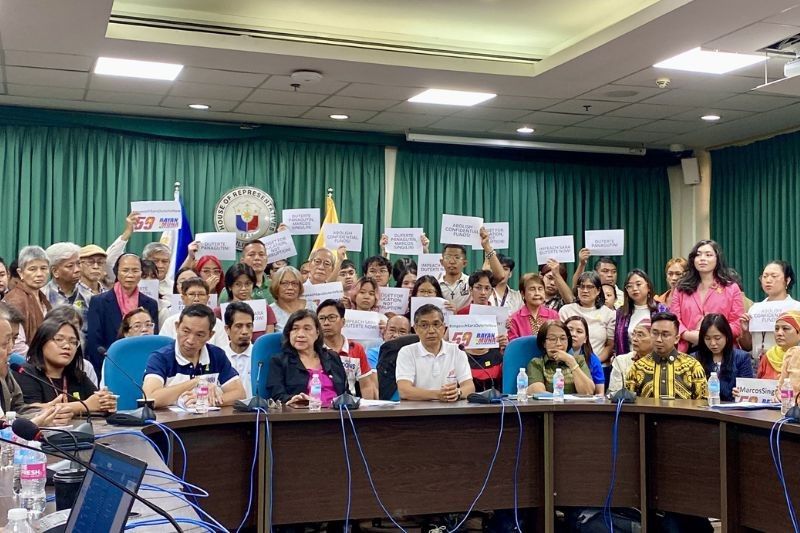
MANILA, Philippines — A few days after the first, a second impeachment complaint was filed against Vice President Sara Duterte on Wednesday, December 4.
However, the second complaint only cited betrayal of public trust as the ground for impeachment, in contrast to the first complaint, which included graft and corruption, bribery, and other high crimes.
Similar grounds were referenced in the second complaint filed by over 70 complainants from various civil society groups, including the marginalized, labor, peasant, environmental, student and rights organizations.
Lawmakers from the Makabayan bloc endorsed the impeachment complaint, which was sworn in before House Secretary General Reginal Velasco. The endorsing lawmakers were Rep. Raoul Manuel (Kabataan Partylist), Rep. Arlene Brosas (Gabriela Women’s Party), and Rep. France Castro (ACT Teachers Partylist)
Former Bayan Muna Rep. Teddy Casiño said in a statement that the reason for citing betrayal of public trust stems from the alleged “abuse, misuse, and wastage” of P612.5 million in confidential and intelligence funds from Duterte’s offices — the Office of the Vice President (OVP) and, previously, the Department of Education (DepEd).
This includes the “red flags” found in the accounting of confidential funds through accomplishment reports and acknowledgment receipts.
Casiño added that Duterte’s “attempt” to “obstruct” the congressional investigation into the use of her offices’ confidential fund by directing the Commission on Audit to disregard the subpoena for reports on the OVP and DepEd.
“We call on Congress to act swiftly on this impeachment complaint. The Filipino people, especially our taxpayers who bear the burden of funding government operations, deserve accountability from their second highest official,” he added.
Why only one ground?
During their press conference, former Bayan Muna Rep. Neri Colmenares, one of the complainants, said they decided to cite betrayal of public trust as the only ground because it is “all encompassing.”
At the same time, he explained that having a single ground for impeachment could fast-track the process, saying it could even be done in just one month.
Colmenares compared it to the 2012 impeachment trial of former Chief Justice Renato Corona, which lasted about four months due to the three grounds and eight articles it had to tackle.
Casiño agreed with Colmenares’ reasoning, saying there is a need to expedite the impeachment of the vice president.
“One ground, three acts. Hindi magtatagal ito. Because there is that factor na nagmamadali tayo. Eh kailangan lang naman sa impeachment with one act, one ground to impeach a high official,” he said.
(One ground, three acts. This won’t take long. Because there is the factor that, we are in a hurry. Well, in an impeachment case, one act and one ground is enough to impeach a high official.)
A challenge for Congress
Meanwhile, Brosas said the impeachment complaints serve to remind lawmakers of the Filipino people’s call, especially in light of the findings from the congressional probe into Duterte’s alleged misuse of confidential funds.
It is not meant to dictate like President Ferdinand Marcos Jr.’s appeal to Congress not to proceed with any impeachment against Duterte.
“Ang sinasabi natin dito separation of powers. Dito dapat tumindig ang Kongreso,”she said.
(What we are saying here is separation of powers. This is where Congress should stand firm.)
Casiño reiterated that there is a “system of checks and balances,” and the Congress is challenged to fulfill its “mandate-bound duty” to process the impeachment complaint despite Marcos’ request.
House lawmakers also said in several statements and press conferences that while the lower chamber has no agenda to impeach the vice president, they will still deliberate on any complaints filed.
The complaints should be referred to the Committee on Justice for deliberation, followed by a discussion at the plenary.
For an impeachment case to proceed to the Senate for a trial, the House of Representatives requires at least one-third vote of its more than 300 lawmakers.
